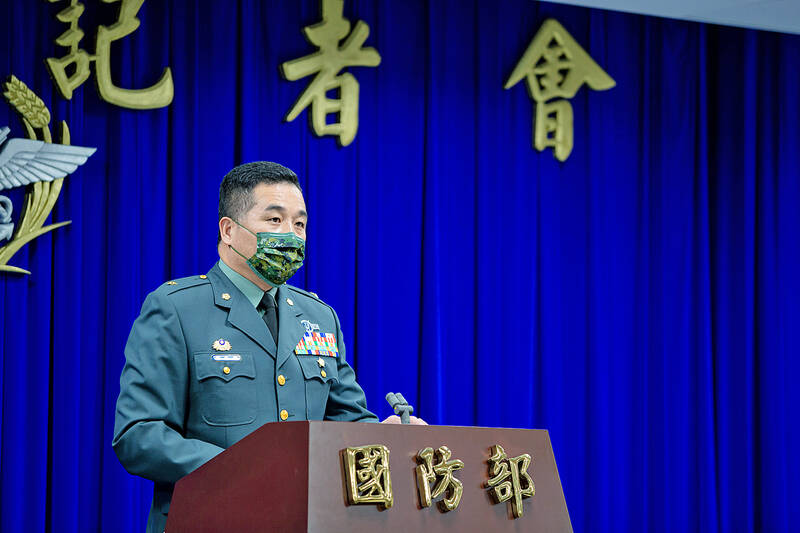Reservists would soon be allowed to voluntarily enroll in dual-track reservist training, which would also be open to female reservists, the Ministry of National Defense said yesterday.
The voluntary program, to be launched in the second quarter, would be the first time that the military has included discharged female military personnel in its reservist training program.
The military runs a dual-track reservist training program that began last year with a comparatively small number of reservists undergoing two weeks of intensive training twice in eight years, while the majority undergo a five-to-seven-day regimen four times in eight years.

Photo courtesy of the Ministry of National Defense
Volunteer reservists in the new program would be able to choose one or two-week training.
For the current training, only male reservists are required to join, with participation decided by a lottery.
Major General Yu Wen-cheng (俞文鎮), a division head of the ministry’s All-Out Defense Mobilization Agency, told a news conference that the new voluntary training would be open to about 500 male reservists and about 200 females.
To encourage reservists who have already completed the required maximum four stints of mandatory training in eight years to join the new voluntary program, the military would give a NT$5,000 one-time bonus to each person who joins the program for a fifth round of training, Yu said.
Those who want to join the voluntary program can log on to the All-Out Defense Mobilization Agency’s Web site to sign up or visit a reserve command or reservist service center, he said.
Previously, the military said it only trained male reservists because it did not have sufficient training capacity to accommodate men and women.
While men are required to take part in compulsory military conscription and reservist training, women can join the armed forces voluntarily to serve as soldiers or officers.
As of 2021, 8,915 women were listed as reservists. Among Taiwan’s 180,000 active military personnel, 15 percent are women, military data showed.
The ministry also gave more details on its planned acquisition of anti-tank munitions, following fears that a proposed purchase of Volcano mine-dispensing systems from the US would litter Taiwan with landmines.
The army would only lay mines on potential landing sites, Army Chief of Staff Chang Yuan-hsun (章元勳) told reporters.
The Volcano system — vehicle-launched anti-tank munition-laying systems and M977A4 HEMTT 10-tonne trucks — were part of a US$180 million package approved by the US Department of State on Dec. 28.
The mines are “smart” and have a digital timer for self-destruction, mitigating worries that they would affect noncombatants, Chang said, adding that the mines are not buried, making them easier to spot.
This would make mine removal after combat much easier and worries about collateral damage — as there has been with older mines buried in Kinmen County — are unnecessary.
The mines would not be deployed “half a year” before an invasion, instead waiting until a landing attack has been confirmed, he said.
The army would be fully responsible for the mine-laying system and would endeavor to minimize the potential of accidental injuries, he added.
Additional reporting by Aaron Tu

The Central Election Commission has amended election and recall regulations to require elected office candidates to provide proof that they have no Chinese citizenship, a Cabinet report said. The commission on Oct. 29 last year revised the Measures for the Permission of Family-based Residence, Long-term Residence and Settlement of People from the Mainland Area in the Taiwan Area (大陸地區人民在台灣地區依親居留長期居留或定居許可辦法), the Executive Yuan said in a report it submitted to the legislature for review. The revision requires Chinese citizens applying for permanent residency to submit notarial documents showing that they have lost their Chinese household record and have renounced — or have never

A magnitude 5.6 earthquake struck off the coast of Yilan County at 12:37pm today, with clear shaking felt across much of northern Taiwan. There were no immediate reports of damage. The epicenter of the quake was 16.9km east-southeast of Yilan County Hall offshore at a depth of 66.8km, Central Weather Administration (CWA) data showed. The maximum intensity registered at a 4 in Yilan County’s Nanao Township (南澳) on Taiwan’s seven-tier scale. Other parts of Yilan, as well as certain areas of Hualien County, Taipei, New Taipei City, Taoyuan, Hsinchu County, Taichung and Miaoli County, recorded intensities of 3. Residents of Yilan County and Taipei received

Taiwan has secured another breakthrough in fruit exports, with jujubes, dragon fruit and lychees approved for shipment to the EU, the Ministry of Agriculture said yesterday. The Animal and Plant Health Inspection Agency on Thursday received formal notification of the approval from the EU, the ministry said, adding that the decision was expected to expand Taiwanese fruit producers’ access to high-end European markets. Taiwan exported 126 tonnes of lychees last year, valued at US$1.48 million, with Japan accounting for 102 tonnes. Other export destinations included New Zealand, Hong Kong, the US and Australia, ministry data showed. Jujube exports totaled 103 tonnes, valued at

BIG SPENDERS: Foreign investors bought the most Taiwan equities since 2005, signaling confidence that an AI boom would continue to benefit chipmakers Taiwan Semiconductor Manufacturing Co’s (TSMC, 台積電) market capitalization swelled to US$2 trillion for the first time following a 4.25 percent rally in its American depositary receipts (ADR) overnight, putting the world’s biggest contract chipmaker sixth on the list of the world’s biggest companies by market capitalization, just behind Amazon.com Inc. The site CompaniesMarketcap.com ranked TSMC ahead of Saudi Aramco and Meta Platforms Inc. The Taiwanese company’s ADRs on Tuesday surged to US$385.75 on the New York Stock Exchange, as strong demand for artificial intelligence (AI) applications led to chip supply constraints and boost revenue growth to record-breaking levels. Each TSMC ADR represents